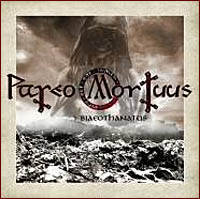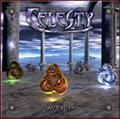PAREO MORTUUS (FRA) - Biaeothanatus (2008)

Label : Auto-Production
Sortie du Scud : 30 juin 2008
Pays : France
Genre : Death / Black Metal
Type : Album
Playtime : 12 Titres - 52 Mins
Autant vous prévenir de suite, avec PAREO MORTUUS, c’est « gloire à notre Mère à tous ; la Mort ! » et « que triomphe la faucheuse ! ». Un trip qui, à la lecture de leur biographie, s’avère ne pas en être un ! Mais alors pas du tout ! Je cite : « PAREO MORTUUS signifie, littéralement, en latin : ‘Obéir’ et ‘Mort’. En effet, à la première seconde de vie sur Terre, nous sommes déjà morts. On ne peut donc qu’obéir à Notre Mère à tous, à celle qui nous prendra un jour, inéluctablement ». Ils pourraient passer pour d’authentiques illuminés, mais j’ai l’intime conviction qu’Ogrim (chant, basse et batterie) et Bulvail (guitare) savent pertinemment de quoi ils dissertent, mieux que quiconque. Et après tout, je ne demande qu’a me prendre une baffe avec ce Biaeothanatus (à mes souhaits !), qu’importe les positions physico-psycho-philosophiques de ses géniteurs. D’ailleurs, question longévité, il y’a déjà sept ans que les lorrains rôdent autour de leur QG qu’est Lunéville avec des compos plein les poches. Les qualifier de novices serait donc un vice.
Pourtant, ce n’est qu’en 2008 que s’est matérialisé leur premier album. De prime abord et découvrant PAREO MORTUUS, j’aurais plutôt misé sur une formation de la trempe d’un SUMMONING, mêlé à la beauté perverse d’un SKUMRING et sujet à un folklorisme aigu comme le laisse penser les nombreux caractères runiques et motifs celtes qui peuplent l’artwork. Eh bien non ! Les Lorrains officient dans un tout bête Black/Death Metal sans fioritures ni froufrous. Ni grande inspiration, soit dit en passant. C’est carré, propre et vicieux. Une qualité quand on sait qu’il s’agit d’une autoproduction. Seulement, à ce tatillonnisme auditif, on aurait aimé voir associé davantage de créativité et d’imagination. Le duo se contente un peu trop à mon goût d’étaler sa palette technique (maîtrise des cordes, de la double et des grunts), négligeant de manière volontaire sans doute l’harmonie. Seulement, maintenir une cadence aussi élevée pendant une heure, c’est clairement faire preuve de solidité, mais c’est également prendre en otage l’auditeur. C’est l’enfermer dans une pièce froide et sombre, où de grosses gouttes semblent suinter de murs métalliques que l’on ne voit pas. Où l’air glacé brûle les bronches et où l’oxygène est trop rare pour espérer survivre. Je n’apprécie que guère d’être mis en captivité, c’est peut-être pourquoi j’ai été relativement indifférent à la proposition faite par PAREO MORTUUS. Biaeothanatus est un vaste champ de ruine, une morne plaine (oui, oui, comme Waterloo…) où s’amoncellent les cadavres et où se décuplent les bunkers creusés par les assauts barbares et inévitablement irréfléchis d’Ogrim et Bulvail. Les seuls survivants du massacre seraient a fortiori « Nailed Hands, Flesh Stamped », « His Holiness Mother Death » avec ses envolées lyriques Black appréciables et pourquoi pas, l’apaisante instrumentale « The Dusk… » qui met convenablement en valeur « … Of A Bitter Victory ». Une fin somme toute classique mais néanmoins au-dessus du lot.
Ce n’est pas avec PAREO MORTUUS que les amateurs de Black/Death burné à la façon d’un BELPHEGOR, BEHEMOTH ou encore NUNSLAUGHTER trouveront de quoi passer une soirée riche en sensations. Eventuellement avec quelques grammes d’alcool dans le sang…
Musicalement intense et bestial, Biaeothanatus reflète un sérieux manque de personnalité. Un opus que j’ai l’impression d’avoir entendu cent fois…
Ajouté : Vendredi 28 Novembre 2008
Chroniqueur : Stef.
Score :   
Lien en relation: Pareo Mortuus Website
Hits: 13103
|














